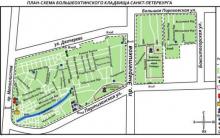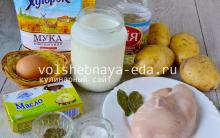Adjective - independent part speech denoting a sign of an object and answering questions Which? which? which? which? whose?
For example: cold; broken.
Participle- a special form of the verb that denotes a sign of an object by action and answers questions Which? which? which? which?
For example: broken, broken by hands.
Adjectives can be formed from nouns ( cold - cold;
glass - glass) and from verbs ( break - broken).
Adjectives formed from verbs should be distinguished from participles.
incl. p adj.
Compare: The Frenchman spoke broken Russian. - A bundle of firewood was collected from branches I had broken.
The main features of distinguishing verbal adjectives and participles
Verbal adjectives have no prefix (except NOT) or dependent word.
adj. communion communion
Compare: painted (unpainted) floor - painted brush floor - By painted floor.
Verbal adjectives can be formed from non-prefixed verbs perfect look, and participle - from non-prefixed verbs of the perfect form.
adj. participle
Compare: worn suit - purchased suit.
wear - unsov.v. buy - sov.v.
Words with the suffixes -ovn-/-evn- without prefixes or dependent words are verbal adjectives.
adj. incl.
Compare: forged chest - a savvy horse.
Some participles can turn into adjectives. To distinguish them, we define lexical meaning of these words.
For example: named (Brother)- named higher brother. We select synonyms: twinned And the one named above. We see that the lexical meaning of words is different. The participle maintains a connection with the verb.
Examples of verbal adjectives:
- planted father - acting as a father at a wedding;
- smart the kid is smart, quick-witted, grasps on the fly.
Pay attention to the stress in these words.
Bibliography
- Razumovskaya M.M., Lvova S.I. and others. Russian language. 7th grade. Textbook. - 13th ed. - M.: Bustard, 2009.
- Baranov M.T., Ladyzhenskaya T.A. and others. Russian language. 7th grade. Textbook. - 34th ed. - M.: Education, 2012.
- Russian language. Practice. 7th grade. Ed. S.N. Pimenova - 19th ed. - M.: Bustard, 2012.
- Lvova S.I., Lvov V.V. Russian language. 7th grade. In 3 hours - 8th ed. - M.: Mnemosyne, 2012.
- How to distinguish participle from adjective? ().
- Russian language in diagrams and tables. Spelling participle suffixes ().
- Devyatova N.M.. Communions and verbal adjectives ().
- Didactic materials. Section "Communion" ().
- Participle formation ().
Homework
Task number 1
Divide the phrases into two columns: a participle or a verbal adjective.
Wound ... th fighter - from the wound ... th soldier, sowing ... th grain - sowing ... th flour, haircut ... th boy - haircut ... hair cut to zero - haircut ... head , distilled ... th water, linen ... th notebook, burnt ... th coffee - burned ... th letter.
Task number 2. Form all verbs from each possible options participles and verbal adjectives according to the model:
adj. adj. incl. incl.
Paint:painted floor - unpainted boards - painted bench - painted
walls - frames are not painted.
Verbs: boil, confuse, weave, dry, stew, bake, frighten, fry.
Task number 3. Say phrases. Justify the place of stress in verbs, participles and verbal adjectives.
Pampering a child is a spoiled child; carbonate water - carbonated water; pleated skirt - pleated skirt; date the manuscript - a dated manuscript; decollete - a decollete dress; dose medicine - dosed medicine; block solution - blocked solution; validate ticket - validated ticket; mask input - masked input; seal a wagon - a sealed wagon; spoil a dog - a spoiled dog; copy documents - copied documents; a fancy-dress ball, to normalize the working day - a normalized day; group sentences - grouped errors; mount equipment - mounted equipment; form a team - a formed team; cartoon image; equip team - equipped team.
You will need
- Text with participles and adjectives;
- Knowledge of the rules for the formation of participles;
- Knowledge of similarities and differences in both parts of speech;
- Knowledge of the formations of adjective adjectives;
- Knowledge of exceptions to the rules.
Instruction
A part of speech denoting a property, belonging or attribute of another part of speech - a noun, but is not associated with it by any process. The adjective is a part of speech dependent on the noun, therefore it inherits all its features. This means that it has three genders: masculine, feminine and neuter, numbers: singular and plural, and also changes according to the noun to which it refers. The adjective answers the question "what?" or "whose?"
« oil paint» (R.p.)
"Buttered Pancake" (Tv.p.)
4. Also, the sacrament can have short form like an adjective. For example: “made” (from “made”) - participle, “bright” from “bright”.
5. As members of the sentence, the participle and the adjective are.
Differences between participles and adjectives
Now, using an example, consider participles from adjectives that characterize the presence of (participles) signs of a verb:
1. Perfect view - “running”, “running” - imperfect view.
2. Return form - "rotating", "rotating" - non-returning form.
3. Time - “running” (present time), “running” (past time).
4. Real or passive meaning tearing a shirt, a shirt being torn.
5. Transitivity: a reading person reading a book.
Exist in adjectives formed from participles. They are called verbal adjectives or adjectives formed adjectively.
Such adjectives are formed for the following reasons:
The emergence of a new meaning for the subject of action, for example, “driving force”;
The occurrence of a figurative meaning in a word that is participle, for example, "brilliant performance";
If the participle denoted the destination to perform some action and became a constant accompanying word for a noun, for example, "condensed milk." Please note that in this example, even the spelling of the word changes, because in the case of a participle, it would be correct to write "condensed";
If the participle is the ability of an object to be subjected to some kind of influence, for example, "an indeclinable adjective."

It is quite possible to distinguish a participle from an adjective in a simple way. Try inserting a word in the sentence after the intended participle or adjective that makes sense for it. For example, in the sentence "We saw birds flying", you can insert the appropriate word "in the sky". "We saw birds flying across the sky." The word "flying" in this case is a participle.
In the sentence “She approached us with a flying gait”, we cannot insert a suitable word for the word “flying”, because it is an adjective and is directly dependent on the noun "gait"
The second way to distinguish an adjective from a participle is rather difficult, because based on knowledge of the formation of participles and adjectives. In most cases, participles have a double "n" in the suffix, unlike adjectives, but there are exceptions to both of these rules that you need to know.

Related videos
Currently, there are many software products in the form of grammar dictionaries that allow you to check your spelling, as well as parse a sentence into parts of speech and identify both participles and adjectives.
To find participle among other parts of speech, it is necessary to know what distinguishes it from them. Firstly, this is a special form of the verb, denoting the sign of the subject by action. Secondly, it has the features of a verb and an adjective.

You will need
- 1. Words
- 2. Communions
Instruction
See what this word has. If these are real participles of the present tense, then you will meet -usch-, -yushch-, -ash-, -yashch. For example, issuing. If these are passive participles of the present tense, then these are the suffixes -em-, -im-. For example, released.
Correctly define the real participles of the past tense. They are characterized by suffixes –vsh-, -sh-. For example, reading, bringing. For passive past tenses, the characters are suffixes –nn-, -t-, -enn-. For example, drawn, offended, sung.
Sources:
- "Modern Russian language", Beloshapkova V.A. 1989.
Communions and gerunds, as well as participial and adverbial phrases, perform different functions in a sentence, play different roles. They also have pronounced morphological differences.

Instruction
Participle(revolution) necessarily refers to the word being defined - a noun or a pronoun, depends on it, changes in numbers, genders and, has a full and - some - a short form.
For example: a smiling person; us, the signatories of this document, ...
Other nominal parts of speech can also act as a defined word, if they are in the meaning of a noun.
For example: a tidy dining room; "154th", who asked for a landing, ... (o). A gerund or participial turnover refers only to the verb-predicate and denotes an additional action with the main one expressed by the verb. Unlike a participle, a participle is an invariable word form.
For example: lying without moving; froze standing in the wind.
Participle and definition functions - single or widespread, consistent or inconsistent, isolated or non-isolated.
For example: Those who calmed down silently and obediently dropped yellow ones.
Participles in short form are used only as a nominal part of a compound predicate.
For example: Hair is silvered with early gray hair. The participle and participle turnover act as different circumstances.
Pale, the dawn subsides (I. Nikitin).
Formal features that distinguish participles and gerunds, are suffixes.
In school classes, all information about suffixes is summarized in tables that are posted on. For convenience, they can be written out, for example, on the cover of a notebook.
Derivational suffixes of real participles: -usch-(-yusch-), -ashch-(-yashch); -vsh-, -sh-; passive: - om-(-em-), -im-; -enn-, -nn-, -t-.
Derivative suffixes of adverbs of the imperfect and perfect form: -a-, -ya-, -uchi-, -yuchi-, -in-, -lice-, -shi-.
The participle is a special verb form that has both the properties of a verb and an adjective. From the verb, the participle has aspect, transitivity, reflexivity and pledge, and from the adjective - change in cases, numbers and gender, as well as agreement with the noun. The participle, like an adjective, denotes a sign of an object.

noun and agree with it in gender, number and case. For example: “boiling stream - boiling stream - boiling stream - boiling streams; boiling lava, boiling milk."
Types and ways of forming participles
Lexical meaning - a sign of an object by action - consists of the grammatical features of this part of speech. For example: “singing birds” (those that sing now), “singing birds” (those that sang in the past), “discussed issue” (the one that someone is discussing now), “discussed issue” (the one that already discussed).
Accordingly, there are 4 forms of participles: real present and past tense, passive present and past tense.
The first group of participles (valid present tense) are formed from the basis of the present tense using the suffixes -usch- (-yushch-), -ashch- (-yashch-). The choice of suffix depends on the verb. For example: “cry-ut - cry-usch-y”, “kol-yut - kol-yushch-y” - I conjugation; “Let-at - let-ash-th”, “kle-yat - glue-box-th” - II conjugation.
Real participles in the past tense are formed from the infinitive by replacing the suffixes -т, -ти with the suffixes -вш-, -ш-. For example: “run-be-bezha-vsh-th”, “carry-ti - carry-sh-th”.
Present passive participles are formed from present tense verbs using the suffixes -em- (I conjugation) and -im- (II conjugation): “lele-em - lele-em-th”, “stor-im - store -im-th."
Passive past participles are formed from the stem of the indefinite form of the verb with the suffix -nn-, if the verbs end in -at, -et. Verbs in -it receive the suffix -enn-, as well as verbs in -ti, -ch, and verbs ending in -ot, -ut-, -yt- receive the suffix -t-. For example: “write - write-nn-th”, “capture - capture-en-th”, “save - save-en-th”, “forget - forget-t-th”.
Short participles, as well as short adjectives, are in the sentence the nominal part of the compound nominal predicate.
Passive participles have a short form with truncated: -a, -o, -s. For example: "sent, sent-a, sent-o, sent-s."
What is a verbal adjective? What is the difference between this part of speech and participles formed, it would seem, in the same way? What is the significance of the origin of an adjective for the spelling of its suffix?
In order to answer these questions, it is necessary to define the terms and what they mean.
An adjective is a part of speech that denotes an independent attribute of an object. The words of this morphological group are either non-derivative (their origin is not motivated by other lexical units), or are formed from (nouns).
Participles simultaneously combine the properties of adjectives and verbs. Their role in the language is the designation of a sign due to action.
A verbal adjective is a special word that can, under certain conditions, become a participle or express an independent attribute of an object. How is this possible?

To understand this phenomenon, it should be remembered that the passive participles are formed exclusively from the action to which a certain object was subjected is complete, and now the result of this process is expressed by the participle:
- overcooked fish - overcook (sov.v.);
- painted fence - paint (sov.v.).
The verbal adjective reminiscent comes from the Action on which the attribute of the object is based is not complete. Therefore, sending a specific characteristic to the process that happened to the object loses its meaning:
- knitted sweater - knit (non-sov.v.);
- wicker basket - weave (non-sov.v.).
Such a sign breaks the connection with the form from which the verbal adjective originated, and now the word indicates the final state of the subject, without regard to its origin: "chiseled pencil", "torn shoe", "pickles".
The spelling of verbal adjectives is a stumbling block in Russian orthography. The problem is to distinguish between homonymous parts of speech.
Students do not understand why both “n” and “nn” can be written in the same word:
- ruble n oh meat;
- ruble nn axed meat.
In fact, everything is very simple. By default, adjectives, except for the exceptions to “ovated” and “ovanny”, are written with one letter “n”. But when dependent words or prefixes appear, this part of speech becomes passive participles, in the full form of which “n” is doubled according to the rule.
- Noshe n th dress (from the verb “to wear” an inconsistent type, there are no dependent words and prefixes);
- Noshe nn oh (by whom?) grandfather's coat (there is a dependent word);
- Zanosha nn th trousers (from the verb "bring in" a Soviet species, there is a prefix).

Of course, as in any rule of the Russian language, this algorithm has its own characteristics. For example, the word “wounded”, formed from a non-prefixed perfective verb, does not fit this rule.
Based on the rule governing the spelling of two similar parts of speech, you can completely eliminate the suffixes of these words.
Some parts of speech are very similar in a number of ways. You can often confuse adjectives with participles: at first glance, both parts of speech answer the question “which?” and play similar roles as members of a sentence. It is important to distinguish between adjectives and participles in writing: this allows you to correctly express your thoughts. To understand how these parts of speech differ, consider and compare their features.
What is characteristic of adjectives and participles?Adjective always denotes a sign, property, belonging to a noun and is closely related to it. It answers questions Which? (what?) or whose? Just like a noun, an adjective has a gender, a number, a declension (i.e. it changes in cases). An adjective is never associated with a noun action, process.
Participle is a special form of the verb. It denotes an action (like a verb), but this action acts as a sign of an object (like an adjective). So, the question for the sacrament can be like this: doing what? what did he do? etc.
There is a special group of adjectives called verbal. They lose the typical features of the verb (kind, voice, tense), lose the possibilities of verb control. They are formed from participles, since:
- the subject of the action has a new value: refined taste(not from the verb "find", but close in meaning to the adjectives "refined", "graceful"), honored artist, well-read boy;
- the word has figurative meaning: strained relationships, brilliant abilities;
- participle means that an object or phenomenon is subjected to some action: shabby look.
Features
So, adjectives and participles can have a lot in common. But there are also very characteristic features.
- The participle does not indicate the quality (as an adjective), but the action being performed. Light (adj.) - luminous (adj.).
- The participle, together with all the words dependent on it, is isolated, i.e. separated by commas when placed after the noun with which it is associated. A neighbor, who was sitting on a bench under a tree, waved his hand in a friendly manner..
- The participle, unlike the adjective, always has verbal features:
- time is present ( doing), past ( doing);
- pledge - valid ( leading) and passive ( slave);
- view - perfect started) and imperfect ( beginning).
- time is present ( doing), past ( doing);
- Unlike adjectives, participles can have a reflexive suffix -sya: read - reading + -sya – readable; build - built + -Xia – under construction.
- And, finally, the most obvious sign is suffixes, which adjectives do not have:
- -ash- (-ash-)
: holding, hanging;
- -usch- (-yusch-)
: writing, tugging;
- -sh- (-vsh-)
: carrying, doing;
- -T-
: compressed, open;
- -om- (-em-)
: driven, recommended;
- -them-
: moving, invisible;
- -enn- (-enn-)
: bought, baked;
- -nn-
: seen, read.
- -ash- (-ash-)
: holding, hanging;
Attention: we write short participles with one n : seen, read, short adjectives have the same number of suffixes n how much in full form: desert - desert, green - green.
The last examples can be bewildering, because adjectives can also have a suffix in the form of a double n . Let's see examples: leafy, stone, pocket. All these words are formed from nouns and do not talk about any action - only about a sign. Therefore, suffixes should not be misleading.
So, despite the fact that the participle has a number of properties characteristic of adjectives, it has enough of its own features to distinguish it from an adjective. These signs must be remembered.
Adjective- an independent part of speech denoting a sign of an object and answering questions Which? which? which? which? whose?
For example: cold; broken.
Participle- a special form of the verb that denotes a sign of an object by action and answers questions Which? which? which? which?
For example: broken, broken by hands.
Adjectives can be formed from nouns ( cold - cold;
glass - glass) and from verbs ( break - broken).
Adjectives formed from verbs should be distinguished from participles.
incl. p adj.
Compare: The Frenchman spoke broken Russian. - A bundle of firewood was collected from branches I had broken.
The main features of distinguishing verbal adjectives and participles
Verbal adjectives have no prefix (except NOT) or dependent word.
adj. communion communion
Compare: painted (unpainted) floor - painted brush floor - By painted floor.
Verbal adjectives can be formed from non-prefixed imperfective verbs, and participles from non-prefixed perfective verbs.
adj. participle
Compare: worn suit - purchased suit.
wear - unsov.v. buy - sov.v.
Words with the suffixes -ovn-/-evn- without prefixes or dependent words are verbal adjectives.
adj. incl.
Compare: forged chest - a savvy horse.
Some participles can turn into adjectives. To distinguish them, let's define the lexical meaning of these words.
For example: named (Brother)- named higher brother. We select synonyms: twinned And the one named above. We see that the lexical meaning of words is different. The participle maintains a connection with the verb.
Examples of verbal adjectives:
- planted father - acting as a father at a wedding;
- smart the kid is smart, quick-witted, grasps on the fly.
Pay attention to the stress in these words.
Bibliography
- Razumovskaya M.M., Lvova S.I. and others. Russian language. 7th grade. Textbook. - 13th ed. - M.: Bustard, 2009.
- Baranov M.T., Ladyzhenskaya T.A. and others. Russian language. 7th grade. Textbook. - 34th ed. - M.: Education, 2012.
- Russian language. Practice. 7th grade. Ed. S.N. Pimenova - 19th ed. - M.: Bustard, 2012.
- Lvova S.I., Lvov V.V. Russian language. 7th grade. In 3 hours - 8th ed. - M.: Mnemosyne, 2012.
- How to distinguish participle from adjective? ().
- Russian language in diagrams and tables. Spelling participle suffixes ().
- Devyatova N.M. Participles and verbal adjectives ().
- Didactic materials. Section "Communion" ().
- Participle formation ().
Homework
Task number 1
Divide the phrases into two columns: a participle or a verbal adjective.
Wound ... th fighter - from the wound ... th soldier, sowing ... th grain - sowing ... th flour, haircut ... th boy - haircut ... hair cut to zero - haircut ... head , distilled ... th water, linen ... th notebook, burnt ... th coffee - burned ... th letter.
Task number 2. Form from each verb all possible variants of participles and verbal adjectives according to the model:
adj. adj. incl. incl.
Paint:painted floor - unpainted boards - painted bench - painted
walls - frames are not painted.
Verbs: boil, confuse, weave, dry, stew, bake, frighten, fry.
Task number 3. Say phrases. Justify the place of stress in verbs, participles and verbal adjectives.
Pampering a child is a spoiled child; carbonate water - carbonated water; pleated skirt - pleated skirt; date the manuscript - a dated manuscript; decollete - a decollete dress; dose medicine - dosed medicine; block solution - blocked solution; validate ticket - validated ticket; mask input - masked input; seal a wagon - a sealed wagon; spoil a dog - a spoiled dog; copy documents - copied documents; a fancy-dress ball, to normalize the working day - a normalized day; group sentences - grouped errors; mount equipment - mounted equipment; form a team - a formed team; cartoon image; equip team - equipped team.











Dua for sadness anxiety and depression
Buddhism: the foundations of religion, how many Buddhists are there in the world
Obligatory prayers: features and order of performance by men
Druid horoscope by date of birth: interpretation and features
What is oregano: all about the amazingly useful seasoning!